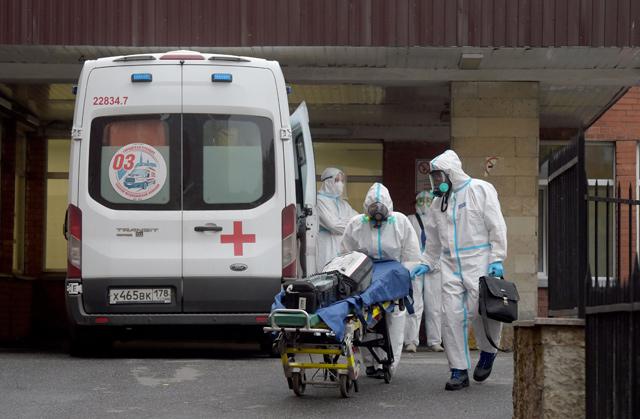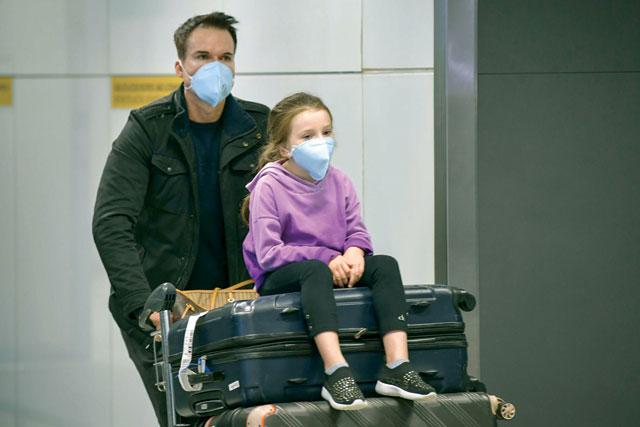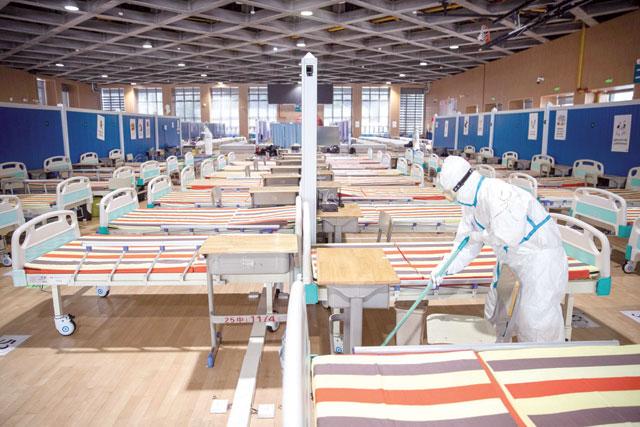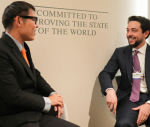You are here
WHO believes 10% of world has had COVID-19, eyes faster reforms
By AFP - Oct 06,2020 - Last updated at Oct 06,2020

Medical workers wearing personal protective equipment move a stretcher with medical equipment outside Saint Petersburg's Pokrovskaya hospital on Monday (AFP photo)
GENEVA — The WHO estimated Monday that 10 per cent of the world has been infected by the new coronavirus — way more than has been recorded — as it mulled speeding up internal reforms.
To date, more than 35 million cases of COVID-19 have been registered worldwide, including some 1.04 million who have died, according to an AFP tally based on official sources.
But the World Health Organisation now estimates that around a tenth of the planet's 7.8 billion or so people have already been infected since the virus first surfaced in China late last year — more than 20 times the official count.
"Our current best estimate tells us that about 10 per cent of the global population may have been infected by this virus," WHO emergencies director Michael Ryan told a special meeting of the agency's executive board.
He stressed that infection levels varied "from urban to rural, it varies between different groups".
"But what it does mean is that the vast majority of the world remains at risk," he warned.
'Wake-up call'
WHO chief Tedros Adhanom Ghebreyesus, meanwhile, told Monday's meeting that the pandemic should serve as a "wake-up call for all of us".
"We must all look in the mirror and ask what we can do better," he said.
Tedros pushed back at criticism of the UN agency's handling of the pandemic, insisting it from the start had "worked around the clock to support countries to prepare and respond to this new virus."
Tedros, wearing a black face mask with a colourful pattern on the sides, also vigorously defended the reform process at the organisation over the past three years, but acknowledged it should be sped up.
“We’re not on the wrong path. We’re on the right path, but we need to go faster,” he said.
The executive board, which is made up of representatives from 34 countries who are elected for three-year periods, is meeting for two days this week for only its fifth-ever special session.
It aims to evaluate progress towards implementing an “impartial, independent and comprehensive evaluation” of the WHO’s response to the pandemic, as requested by member states.
‘New ideas’
Tedros said countries were being encouraged “to come with new ideas”, insisting that “we have to be open to change and we have to implement changes now”.
He stressed for instance the need for “robust peer-review” of countries’ records on health.
He suggested that the Universal Periodic Review at the UN Human Rights Council, where each country’s rights situation is evaluated every few years, could serve as inspiration.
The WHO has met with harsh criticism for its pandemic response, in particular from the United States, which under President Donald Trump has begun withdrawing from the organisation it accuses of sounding the alarm too late.
Tedros has flatly denied that, insisting that the WHO had acted swiftly as soon as it received word of the new virus, and pointing out that it had declared the highest level of alert on January 30.
The organisation has also been criticised for slow or changing recommendations on the best measures to take in halting the spread of the virus, including on the importance of wearing face masks.
Tedros stressed the WHO’s massive effort to provide up-to-date and accurate information in the face of a rapidly-developing global crisis.
“Ten months ago, this virus was completely unknown to the world,” he said.
“We have now published more than 400 guidance documents for individuals, communities, schools, businesses, industries, health workers, health facilities and governments.”
“WHO doesn’t have the mandate or the capacity to do everything,” he said, adding though that it was uniquely positioned to coordinate the global response.
Mental health
COVID-19 pandemic is having a “devastating impact” on mental health services globally, WHO said Monday, ahead of a large fundraising push.
It warned that mental health had been overlooked in the crisis, pointing to a survey conducted between June and August that revealed severe disruptions to services in 93 countries.
While 83 per cent of the 130 countries surveyed had included mental health in their coronavirus pandemic response plans only 17 per cent had actually set up the full funding required, it said.
“This is a forgotten aspect of COVID-19,” WHO Mental Health Director Devora Kestel told a virtual media briefing, stressing the urgent need for increased funding.
Before the pandemic, countries were spending less than 2 per cent of their national health budget on mental health, and were struggling to meet demand, the WHO said.
That demand has now dramatically increased due to the pandemic.
“Bereavement, isolation, loss of income and fear are triggering mental health conditions or exacerbating existing ones,” the agency said in a statement.
“Many people may be facing increased levels of alcohol and drug use, insomnia, and anxiety.”
The WHO also said more data was needed on COVID-19’s effect on brain health, with fewer than one in 10 countries conducting research.
The WHO said that estimates before the coronavirus pandemic showed that nearly $1 trillion in economic productivity was lost annually from depression and anxiety alone.
However, studies showed that every dollar spent on evidence-based care for depression and anxiety returned $5.00.
On Saturday, the WHO is hosting on social media “The Big Event for Mental Health”, calling for increased investment.
Those taking part include Queen Mathilde of the Belgians; footballer Alisson Becker, the Brazil and Liverpool goalkeeper; and pop star Lady Gaga’s mother Cynthia Germanotta.
Also involved are the widow of Chester Bennington, the Linkin Park singer who committed suicide in 2017, and Klas Bergling, the father of the Swedish superstar DJ Avicii, who was found dead two years ago aged 28.
Related Articles
GENEVA — There are now more new cases of the coronavirus reported each day outside China than inside the hardest-hit country, the World Heal
GENEVA — The new coronavirus outbreak can now be described as a pandemic, the head of the World Health Organisation announced Wednesday.WHO
PARIS — Could delivering COVID-19 immunity directly to the nose — the area of the body via which it is most likely to be transmitted — help



















